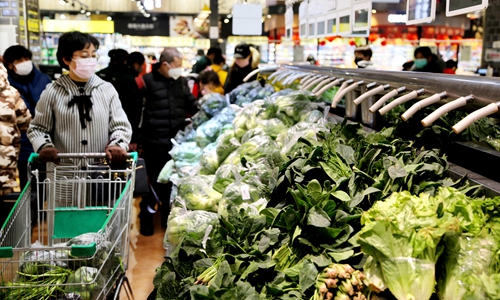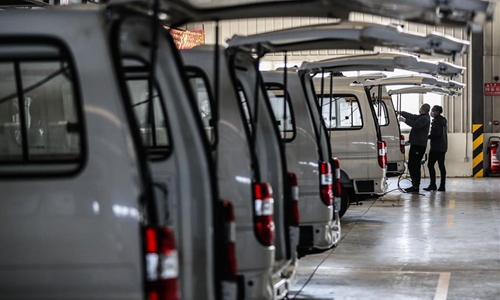
A customer shops at a supermarket in East China's Jiangsu Province on Monday. Photo: cnsphoto
China's Consumer Price Index (CPI), a main gauge of inflation, soared by 5.4 percent year-on-year in January, the highest level since November 2011 and surpassing analysts' expectations.The National Bureau of Statistics (NBS) attributed the CPI rise, which was a big jump from December's 4.5 percent, to a mix of factors including the Spring Festival holidays, the unexpected outbreak of the novel coronavirus pneumonia and year-earlier base effects.
The gain was fueled by a surge in food prices. In January, pork prices rose by 116 percent year-on-year, contributing a 2.76 percentage point increase in the CPI and up from December's 97 percent growth.
Prices of beef, poultry, lamb and duck also rose by between 10.4 percent and 20.2 percent year-on-year in January, the NBS data showed.
In total, food prices jumped 20.6 percent year-on-year, contributing to a 4.1 percentage point increase in the CPI. Non-food prices rose 1.6 percent year-on-year in January.
Central China's Hubei Province, the epicenter of the epidemic, saw its CPI grow 5.5 percent in January. The rise was largely in line with the national CPI growth and reflected Hubei's efforts to stabilize consumer prices, said Dong Lijuan, a senior statistician of the NBS.
Experts said the epidemic has pushed up consumer prices in the short term due to supply disruptions.
"The virus-triggered city lockdowns and other disease-prevention efforts have halted manufacturing and logistics, leading to supply shortages and pushing up consumer prices in the short term," Tang Jianwei, a senior macroeconomic analyst at the Bank of Communications, told the Global Times.
But he said that in the longer term, the epidemic will push down consumer prices by suppressing demand. "The domestic inflation rate is likely to edge down from the second quarter," he said.
Cong Yi, a professor at the Tianjin University of Finance and Economics, said that China's CPI growth is likely to stand at around 4.5 percent in the first half of this year, and the government is likely to set this year's CPI growth target at around 4 percent. China's CPI rose 2.9 percent year-on-year in 2019, within the government's target of 3 percent.
According to Cong, China's economy is facing double pressure from high consumer inflation and stagnant manufacturing.
The Producer Price Index (PPI), which measures the cost of goods at the factory gate, rose by 0.1 percent year-on-year in January, up from a 0.5 percent decline the previous month, but experts have forecast that the PPI would drop in the coming months as industrial demand is likely to edge down under influence of the epidemic.
Ma Jun, a member of the monetary committee of the People's Bank of China, China's central bank, suggested that China should consider lowering the benchmark interest rates to help businesses get through the tough times.
But Cong said that it would be more effective for the government to roll out active fiscal policies, such as tax cuts, to activate the markets, increase employment and pull the market out of the negative impact of the epidemic.



